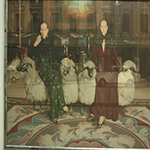Euroacademia Conferences
 Europe Inside-Out: Europe and Europeanness Exposed to Plural Observers (9th Edition) April 24 - 25, 2020
Europe Inside-Out: Europe and Europeanness Exposed to Plural Observers (9th Edition) April 24 - 25, 2020 Identities and Identifications: Politicized Uses of Collective Identities (9th Edition) June 12 - 13, 2020
Identities and Identifications: Politicized Uses of Collective Identities (9th Edition) June 12 - 13, 2020 8th Forum of Critical Studies: Asking Big Questions Again January 24 - 25, 2020
8th Forum of Critical Studies: Asking Big Questions Again January 24 - 25, 2020 Re-Inventing Eastern Europe (7th Edition) December 13 - 14, 2019
Re-Inventing Eastern Europe (7th Edition) December 13 - 14, 2019 The European Union and the Politicization of Europe (8th Edition) October 25 - 26, 2019
The European Union and the Politicization of Europe (8th Edition) October 25 - 26, 2019 Identities and Identifications: Politicized Uses of Collective Identities (8th Edition) June 28 - 29, 2019
Identities and Identifications: Politicized Uses of Collective Identities (8th Edition) June 28 - 29, 2019 The European Union and the Politicization of Europe (7th Edition) January 25 - 26, 2019
The European Union and the Politicization of Europe (7th Edition) January 25 - 26, 2019 7th Forum of Critical Studies: Asking Big Questions Again November 23 - 24, 2018
7th Forum of Critical Studies: Asking Big Questions Again November 23 - 24, 2018 Europe Inside-Out: Europe and Europeanness Exposed to Plural Observers (8th Edition) September 28 - 30, 2018
Europe Inside-Out: Europe and Europeanness Exposed to Plural Observers (8th Edition) September 28 - 30, 2018 Identities and Identifications: Politicized Uses of Collective Identities (7th Edition) June 14 - 15, 2018
Identities and Identifications: Politicized Uses of Collective Identities (7th Edition) June 14 - 15, 2018
French Critical Theory and the Culture Wars of the U.S.
-
-

-
Presentation speakers
- Andrea Liu, UDK Berlin/ Counterhegemony: Art in a Social Context
Abstract:
My paper looks at how various European post-structuralist theorists of the 70´s and 80´s (Foucault, Derrida, Barthes, Baudrillard) had a far greater influence on the American art world and the formation of art discourse in the U.S. than on the intellectual milieu of their own countries, igniting what might be understood as a “postmodern revolution” in academia, cultural production, and discourse that is now the taken-for-granted starting point from which a great deal of art discourse in the U.S. is derived. Jan Verwoert once said “October killed painting.” October, an American art journal started in 1976, was a stronghold for art critics (Hal Foster, Benjamin Buchloh, Douglas Crimp, Rosalyn Deutsche) who were essentially the progeny of the discursive space opened up by Derrida, Foucault, Barthes, and French critical theory. Rejecting the highly commercialized cult of “beauty” and art-as-an-expression-of-autobiography as found in the rise of Abstract Expressionist painting in the 1980´s, October art critics instead largely theorized art in a post-structuralist vein: rejecting notions of originality, authenticity and “aura” to instead embrace quotation, appropriation and repetition of existing images; a shift from conceptualizing artwork as a monolithic finished totality with a centered subject to, instead, an unstable field of contending valences; a de-fetishizing of the autonomy of the art object; and the post-studio post-medium condition. With the impact of post-structuralist theory from Europe came the rise of “social constructionism” in the U.S.: that is, a rejection of the notion of a timeless, universal, self-evident “truth,” nor the existence of “objective knowledge,” “human nature,” nor an unproblematic coherent “self” at the core of human experience, nor “history” as a teleological progression. How is it that French theory such as Foucault, Derrida, and Baudrillard were so influential in American academia, giving rise to the field of “cultural studies” and queer discourse, but were largely ignored by the intellectual establishment of their own country? This paper unpacks the cross-pollination of French critical theory with the culture wars of the U.S.—a seminal time in the U.S., post-1968, after which the embattled Left retreat into academia. Moving their site of contestation from the streets to instead the politicization of the production of knowledge, French critical theory was their most potent ally.
-
Related Presentations

From Crisis to Prosperity: Paving the Way to the Future of Europe
- Gerhard Eichweber

















